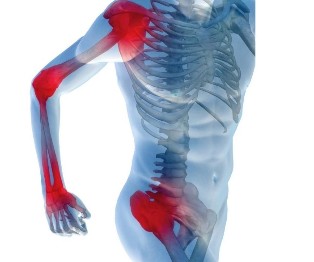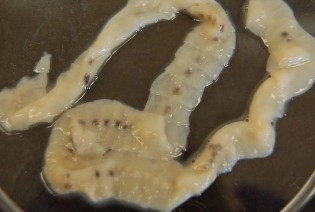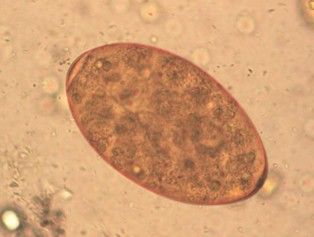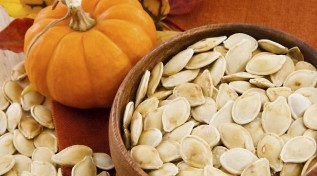One of the most common troubles for patients of infectious diseases-parasitologist are worms in the intestine. Parasitic infection annually kills more than 16 million lives across the globe. Therefore, it is important to know the enemy in the face and recognize early warning signals of pathology. Ideally, to comply with the measures of prevention, in which intestinal parasites in humans won't start. What are the types of intestinal parasites in humans and what are the symptoms of worm infestation, described below in the material.
How is the infection?

It is important to understand that infection with worms occurs always only by the fecal-oral route. That is, the infection mechanism looks like this:
- Worms infected person or animal defecates.
- Feces contaminated with the eggs of worms, located in the external environment. It was here with him can contact Pets, garden greens, vegetables, fruits, and people.
- The parasite eggs are transferred to mouth with food provided substandard hand wash.
- Or eggs of worms can get into the human stomach with the food (poorly washed vegetables, fruit, herbs, roasted meat or fish).
In addition, worms can enter the human body and these ways:
- Using insects (fleas, flies, cockroaches), which carry on their paws parasite eggs;
- Through swimming in contaminated bodies of water;
- When walking barefoot on contaminated soil.
Important: in any case first be worms in the stomach and then reaches the intestine. It was there that they grow and develop into Mature individuals capable of laying eggs.
The types of intestinal parasites in the body
Types of helminthic infections there are over a hundred. However, the most common parasites in the human intestine is not more than 10 species. The following is a list of common worms in Central and Eastern Europe:

- Pinworms. The most frequent "guest" in children aged 3 to 14 years. The maximum length of about 1 cm parasite helminth is Localized mainly in the small and in the large intestine. Their eggs are laid in the folds of the skin of the anus. When this egg Matures within 5 hours after the female laid it. As a result of scratching the anus if itching re-infection of parasite infection through the hands and through the mouth in the future.
- Ascaris. The maximum size of the parasite can reach 40 cm Form of the worm — spindle. Helminth is localized mainly in the intestine. But it can the blood to migrate through the body and stay in the lungs, liver, heart and even brain. The worm feeds on the blood of man, that sooner or later leads to persistent anemia. It is noteworthy that the roundworm eggs can survive in soil up to 3-5 years.
- Giardia. It's simple, choose which area of their habitat in the human intestines, the liver or gallbladder. Carriers of such parasites in the gut are cats, dogs and rodents. Also carry the eggs of protozoa can insects. Giardiasis with poor and delayed treatment can lead to serious intoxication of the human body and the CNS.
- A tapeworm. The maximum size of the parasite can reach 10 meters. And the cycle of life in the human body is up to 25 years. The main cause of infection is the ingestion of fish and its derivatives that have not passed sufficient heat treatment.
- Toxocara. Dangerous because a parasite in the human body, not standing out in this out. Can live in stomach, in rectum, in the bronchi and even in the eyes. The maximum length reaches 30 cm Toxocara Toxocariasis can cause serious harm to the human body.
- Bovine and porcine apni. These worms enter the human body with the meat of cows or pigs, have not passed sufficient heat treatment. The body length of the individuals can reach 2 to 7 meters. The life cycle of the parasite is up to 20 years. Main danger from tapeworms is that they eat through the resources of the human body. Thus for a long time may remain undetected.
- Tapeworm and alveoli. This kind of worms enters the body through dirty hands and mouth. That is, first be parasites in the human stomach, and later on in the intestine.
- The whipworm. This parasite provokes a disease called trihozefalez. These worms live in the human stomach and in the colon. In case of untimely detection and treatment lead to appendicitis and anemia.
- Ancylostoma. This worm has a rounded shape and a light pink pigment. Its length can reach 14 mm. helminth Feeds on the human blood by sucking in the day, about 0.35 ml of blood. That is why the main feature of this worm infestation is anemia and anemia.

Symptoms of parasites in the gut
It is important to understand that the symptoms of parasites in the intestine can be common for any helminth infection, and manifest in the form taken separately for each species of parasites signs. So, common symptoms for parasitic infections as follows:
- Soreness in the muscles and joints. This leads to the accumulation of toxins that secretes into the bloodstream of human helminth in the course of their life. That is intoxication.
- Disorders chair. And can be as diarrhea and constipation.
- Inflammatory processes in the intestine. They occur because of violation of the integrity of the walls of the intestinal helminths. As a result, all nutrients are absorbed with little effect. The presence of intestinal parasites shows symptom — high levels of fat in conducting coprogram (stool test).
- Low level of hemoglobin. However, his level is not corrected by iron preparations.
- Allergic rashes. Are response the immune system's response to the introduction of worm infestation.
- Weight loss for no apparent reason. Is due system lack of nutritious and useful to human body substances.
- General fatigue and nervousness. Are the results of intoxication.
- The formation of benign and malignant tumors. Especially in the digestive tract.
There are also a number of characteristic features of parasitic infections, inherent in the different types of parasites in the human body.
Pinworms (enterobiasis):
- Intolerable nightly itching in the area of the anus;
- Mucus in the feces;
- Pain in the lower abdomen.
Ascariasis:
- Night dry cough and shortness of breath;
- Increased body temperature;
- Excessive sweating;
- Pain in the lungs and heart;
- Nausea and vomiting;
- Bloating;
- Yellowing of the skin and sclera of the eye.
Giardiasis:
- Loss of appetite;
- Eczema and urticaria;
- Sharp intestinal pain;
- Headaches;
- Abnormal heart rhythm.
A tapeworm:
- Constant nausea and dizziness;
- Enlargement of the spleen and/or liver;
- Acceleration of heart rate;
- Numbness of the legs and paralysis;
- The disruption of memory and a sharp decline in concentration;
- Malfunctions of the vestibular apparatus;
- Pallor of the skin.
Toxocara:
- Sleep disorders;
- Periodic attacks of suffocation;
- Swollen lymph nodes;
- Increased body temperature;
- Lacrimation and purulent inflammation of the eye;
- Reduced vision;
- Vomiting and nausea;
- Cough the type of bronchitis.

Bovine and porcine cepni (beef tapeworm infection and cysticercosis):
- Discomfort in the anus;
- Identification of under the skin and in the Kale proglottid;
- Fainting;
- Anemia;
- Reduced sensitivity and subsequent paralysis;
- Blindness and increased sensitivity to light;
- Irritability;
- The appearance of hallucinations;
- The formation of tumors.
Tapeworm and alveoli:
- Red spots all over body;
- Weight loss;
- Dizziness;
- Pain in the chest and in the right hypochondrium;
- The diarrhea and vomiting.
Ancylostoma:
- Weakness and headache;
- Increased salivation;
- Heart pain and shortness of breath;
- Inflammatory processes in the organs of vision;
- Disruptions of the menstrual cycle;
- Infertility;
- Pain in the stomach;
- Belching with bad taste.
Important: if symptoms persist of the parasite in the human stomach or in the intestine should immediately contact infectiologist or parasitologist. Delay could cost lives.
If the medication against worms for some reason impossible, you can use for treating a helminth infection folk remedies. In particular, the use of such anti-parasites:
- Rosemary and celandine — from Giardia;
- Pumpkin seeds – from pinworms;
- Pomegranate peel — off of Ascaris.
In addition, you can include in the diet of such animals products:
- Garlic;
- Spicy black pepper and red;
- Cinnamon and ginger;
- Cloves and cardamom.
Can be drunk against worms such herbal teas:
- Tansy;
- Wormwood;
- Nard.
As cleansing the body also have an enema with garlic or with soda. You can once a year to clean the body with brandy and castor oil. For this night, to drink 50-100 ml of brandy and 15 minutes later, 50 ml of warmed up to 40 degrees castor oil. The next morning should happen diarrhea, along with where you will come out and all the parasites.

It should also be noted that along with folk remedies or medication it is important to create an inhospitable environment for worms. And for that you need to reconsider your diet. From the menu should exclude all sweets and meat, fatty and smoked. The diet should be simple cereals, vegetables, fruits and berries and sour-milk products, nuts, legumes, strawberry, currant, cream.
Prevention
In order to avoid a possible infection by worms, should adhere to basic prevention measures. These are:
- Thorough hand-washing before eating, after toilet, after touching animals or working in the garden/the garden;
- Timely and regular deworming of domestic animals;
- Limit contact with outdoor animals and birds;
- Thorough washing of vegetables, fruits and greens before use;
- Boiling water or use to eat only purified water;
- Regular house cleaning and the fight against insects.
Remember that parasitic disease in the abdomen in an adult and a child is always easier to prevent than to reap the benefits of worm infestation and the long-term to deal with it. Keep hands clean and stay healthy!

































